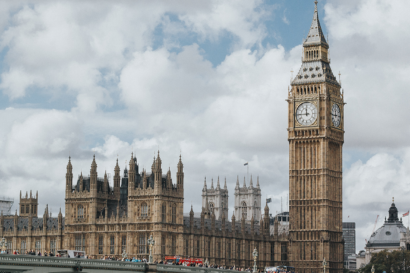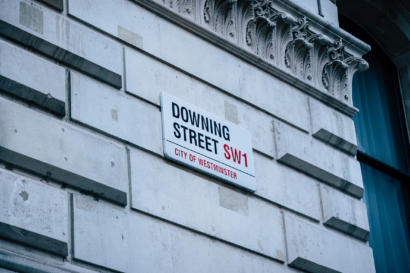AG INSIGHT | 14/03/2024
Red tape and green growth: the role of regulation in restoring nature and delivering net zero

Sir James Bevan, former Chief Executive of the Environment Agency, in his personal capacity reflects on the nature of regulation and the economic and environmental benefits that well-designed regulation can deliver at the launch of the Aldersgate Group’s latest report, The role of regulation in restoring nature and delivering net zero.
I have three messages for you. The first message is that regulation works: it can and does restore nature, tackle climate change, and promote growth. Second message: if it is to work, it needs to be done right. Third message: if we really want to restore nature, tackle the climate emergency and save the planet, we are going to have to regulate better and differently.
Regulation works
So, to my first point: regulation works. Let me give you some examples from my own former world in the Environment Agency.
Restoring nature: in 1957 the Thames in London was declared biologically dead. A recent survey by the Zoological Society of London reported that the river is now home to 92 bird species and 115 marine species, including sharks, seahorses, eels and seals. You find the same resurgence of life in and around all our major rivers around the country. That is a direct consequence of good regulation: strong legislation passed by the government to prevent pollution, robustly enforced by the regulator (in this case the EA), and underpinned by massive investment by the water companies to help clean up our waters.
Tackling climate change: good regulation is at the heart of this. The EA is progressively reducing the greenhouse gas emissions that cause climate change by regulating down the emissions of most of the sectors involved. Since 2010, emissions from the sites the EA regulates (power stations, landfill sites etc) have decreased by more than 50%.
Promoting growth: by regulating the new technology (hydropower, tidal barrages, low or no carbon manufacturing, etc) which is helping get us to net zero, the EA is creating a level playing field for businesses and helping drive innovation and growth.
But it needs to be done right
Second message: not all regulation is good regulation. If it’s going to have the effects we want, it needs to be done right. That means regulating the right things in the right way.
At its heart regulation is about managing risk. Nothing in life is risk-free. But you only need regulation where there is a material risk to life, livelihoods or the environment which needs to be carefully managed. That is why the Environment Agency regulates nuclear power stations, oil refineries, chemical plants and the waste industry but not (say) ice-cream sellers or kite-flyers.
Just as important as regulating the right things is regulating in the right way. Good regulation is outcome focused, risk-based, proportionate, and (provided businesses play by the rules) business friendly.
We can do it better: here’s how
Third and final message: while we are pretty good at regulation in this country, we can and must do it better in future. That’s because the two biggest challenges we face – the nature crisis and the climate emergency – are fast moving and dynamic, which means we will not tackle them successfully just by doing more of the same. So we do need to think and act different.
What would that mean? It would mean, I think, following all of the policy recommendations outlined in this excellent report.
We should indeed target outcomes not outputs (or inputs): as I’ve said, all good regulation is outcome focused.
We do need – as the report also recommends – a full assessment of societal costs and benefits when deciding whether, what and how to regulate; to recognise the cost of inaction or insufficient action; and to understand where our climate and nature tipping points are so we can act before we reach irreversibility. Left unchecked, the impacts of a changing climate will be far more costly – in lives, livelihoods and cash – than the costs of intervening now to prevent those impacts.
We do need innovation at scale. As the report notes, the right regulation can help incentivise new technology and new ways of doing things by providing a level playing field and certainty for investment.
We do need cross-sector collaboration. Nature is one system and indivisible. We cannot hope to protect and restore it by action in one sector if what we are doing in another sector is pushing in the opposite direction. And each of us in our different sectors can learn from our colleagues in others. None of us is as good as all of us.
We do need to ensure, as the report stresses, that the polluter pays. This is a hallowed environmental principle. But it is still not being fully respected in practice. Farmers or water companies who pollute local rivers are, even if they are fined, not paying the true cost of the damage they cause. Nor are motorists or airline passengers, in terms of the real cost of the carbon their journeys are emitting.
I also put a big tick by the report’s final policy recommendation, which is that we should ensure the resources of regulators match their responsibilities. The EA, like Ofgem who are cited in the report, has regularly been loaded with new regulatory duties by the government of the day without any of the additional resources necessary to give effect to them. That is fake regulation, and it won’t work. In the end, we will get the environment – and the climate – we pay for.
If I could add three more policy recommendations of my own to maximise our chances of restoring nature and successfully tackling climate change, they would be these: prioritise green growth, join the policy dots, and tell the story better.
I say prioritise green growth because we cannot ask the public to choose between tackling the climate emergency on one hand or having the jobs, homes and prosperity everyone wants on the other. We have to do both, and with the right policies to drive green growth we can. And prioritising this is essential if we are to succeed. Every government has an infinite amount of demands on its attention and resources, but in my experience governments, like people or organisations, can really only do one big thing at any time. Good strategy is about choice: unless a future government puts green growth at the top of its priorities, it won’t happen.
I say join the policy dots because we will not successfully restore nature or overcome the climate emergency until all our big policies – on energy, transport, homebuilding, industry etc – are aligned; and until all our other tools – the regulatory, fiscal and legal frameworks, government funding, political support and all the other signals we can give to business and the public to incentivise the behaviour we need – are also all pointing in the same direction and supporting each other to secure our aims.
Let me give you just one example of policy unalignment, between our transport policy and our net zero policy: travelling from London to Edinburgh. It is far cheaper to fly or drive that route than it is to take the train, which emits far less carbon per passenger mile than planes or most cars. So our transport policy is encouraging people to do something which is directly undermining our climate policy. Government can do something about this, by setting a policy, tax and legal framework that incentivises people to travel in ways that emit less or no carbon.
And I offer my final recommendation, tell the story better, because unless people understand what we need to do to restore nature and tackle climate change, it won’t happen. This is partly a presentational point: for many audiences it is better to talk about green growth because pretty much everyone wants that, than it is to bang on about the climate emergency or net zero which for some have become toxic phrases.
But there’s a deeper substantive point about telling the story, whatever words we use. Restoring nature and tackling climate change will require massive changes in the way we live, in the homes we build, in how we travel, how we use water, what we produce and how we dispose of the things we no longer need. That will require all of us to change our behaviour, sometimes in ways that will be challenging or unwelcome. Big behaviour change at scale is possible – beating children, smoking indoors or driving without a seatbelt used to be common in our society and are now almost unthinkable. But behaviour change only happens after years of talking about the rationale for and benefits of that change, and the people who need to lead that conversation are our politicians and governments.
Good regulation can deliver green growth, a blue planet, and a brighter future
Our former Prime Minister Mrs Thatcher was the first major world leader to call, at the UN in 1989, for action to tackle climate change. She saw no contradiction between the capitalism she believed in so strongly and saving the planet. On the contrary, she made a powerful argument that only business and the free market could do that.
In her landmark speech Mrs Thatcher said this:
“As well as the science, we need to get the economics right. That means first we must have continued economic growth in order to generate the wealth required to pay for the protection of the environment. But it must be growth which does not plunder the planet today and leave our children to deal with the consequences tomorrow.”
She was equally clear that the private sector is central to the solution: “It is industry which will develop safe alternative chemicals for refrigerators and air-conditioning. It is industry which will devise bio-degradable plastics. It is industry which will find the means to treat pollutants and make nuclear waste safe. “
But if business is to invent and deliver the future we want, it does need the right regulatory framework. Good regulation is not red tape: it is what will get us green growth, a blue planet, and a brighter future. The report the Aldersgate Group is launching can help us achieve that, and I welcome it.



